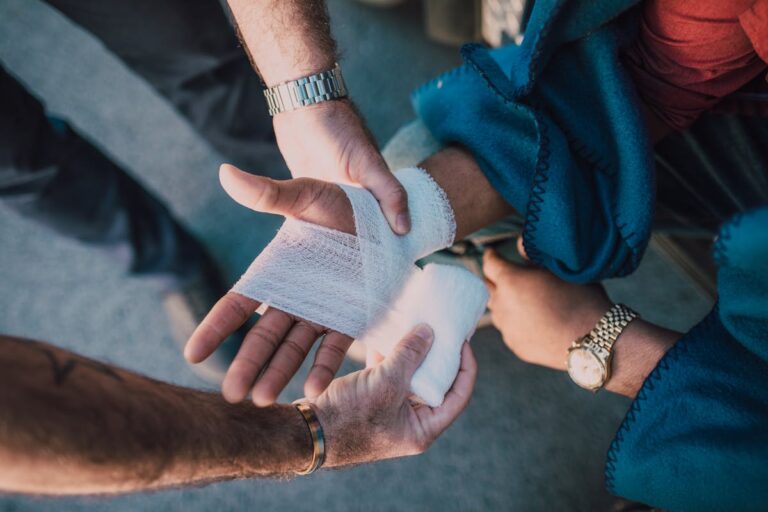Traversing the legal landscape after a personal injury can be intimidating, hence the need for an exceptional lawyer to guide the process. Selecting the right legal representative involves a thorough assessment of their experience, specialization, communication skills, reputation, fee structure, and responsiveness. Each of these factors plays a pivotal role in ensuring a favorable outcome for your case. However, how does one analyze these elements effectively? In the subsequent discussion, we will unravel how to meticulously evaluate each aspect to secure the most competent injury lawyer for your case.
Understanding Personal Injury Law
Personal injury law, often referred to as tort law, is an intricate legal terrain that warrants thorough understanding. It primarily pertains to legal disputes that arise when one party suffers harm from an accident or injury, and someone else might be legally responsible for that harm. The personal injury basics involve understanding the legal terminology such as ‘plaintiff’, the person harmed, and ‘defendant’, the person accused of causing the harm. The law aims to allow the injured party to be ‘made whole’ after they’ve suffered harm due to someone else’s negligent or intentional conduct. The legal terminology involved is vast and can be complex, necessitating the need for expert legal guidance.
Importance of Lawyer’s Experience
The experience of a lawyer can considerably impact the outcome of a personal injury case. The legal expertise of an attorney, honed over years of practice, can provide a profound understanding of the complexities of personal injury law. Analyzing a lawyer’s track record can also provide insight into their ability to successfully represent clients in similar cases.
Evaluating Legal Expertise
How important is it, you may ask, to evaluate a lawyer’s experience when seeking representation for an injury claim? The answer is: extremely. A lawyer’s legal expertise, demonstrated through legal certifications and proven negotiation strategies, is a critical factor to take into account. Legal certifications indicate a lawyer’s proficiency in specific areas of law, providing a benchmark for their knowledge and skills. Likewise, a lawyer’s negotiation strategies can showcase their ability to effectively advocate for you and secure a favorable outcome. As a result, evaluating an injury lawyer’s legal expertise can greatly increase your chances of winning your case or obtaining a fair settlement. Always remember, the expertise of your lawyer can be a game-changer in the complex world of personal injury law.
Track Record Analysis
An overwhelming majority of successful injury claims share one common factor: representation by an experienced lawyer. This is where analysis of a lawyer’s track record becomes vital. Track record types can be varied – some lawyers may boast a high settlement rate, others may pride themselves on their court victories. Consequently, evaluating a lawyer’s past performance can serve as a substantial success indicator. It can offer insights into their expertise, strategy, and dedication. An attorney with a strong track record in injury cases is likely to be well-versed in dealing with insurance companies, negotiating settlements, and arguing cases in court. As a result, thorough track record analysis, paired with careful consideration of success indicators, can greatly assist in finding the best injury lawyer.
Evaluating Track Record of Success
A vital component in choosing the best personal injury lawyer lies in examining their track record of success. This involves a detailed analysis of their past case results and a thorough understanding of their settlement success rates. This evaluation provides a reliable indicator of their capabilities, ensuring a more informed decision is made.
Assessing Past Case Results
Evaluating the track record of an injury lawyer requires a thorough assessment of their past case results. This process involves a detailed case study analysis, examining the complexity of the cases handled, the strategies employed, and the eventual settlement outcomes. The best injury lawyers consistently achieve favorable results for their clients, regardless of the challenges involved. However, success isn’t solely defined by the amount won—it also includes obtaining favorable terms, securing appropriate medical care, or reaching a fair settlement that respects the client’s wishes. If you’re navigating this process, finding the right injury lawyer with a strong history of securing just outcomes can make a significant difference. Remember, while past performance provides valuable insights, it doesn’t guarantee future success. Always consider this alongside other factors when choosing an injury lawyer.
Understanding Settlement Success
How does one gauge the settlement success of an injury lawyer? The answer lies in systematically evaluating their track record in settlement negotiations. A lawyer with a high success rate in securing fair and adequate compensation for their clients is a strong indicator of their negotiation skills and strategic approach. It is worth noting, however, that every case is unique and past success does not guarantee future results. Analyzing the lawyer’s compensation strategies can also provide insight into their ability to effectively advocate for their clients. They should demonstrate a keen understanding of the legal intricacies involved in personal injury cases and be able to devise tailored strategies that maximize the potential for a successful settlement.
Assessing Communication Skills
Wondering what sets apart a good injury lawyer from a great one? One key factor lies in their communication skills. A superior attorney demonstrates active listening, taking time to fully understand your situation before providing legal advice. This skill is essential in comprehending the nuances of your case, and ensuring your story is accurately portrayed. Additionally, they provide clear explanations, breaking down complex legal jargon into understandable language. This transparency enables you to make informed decisions about your case. Consequently, when evaluating potential lawyers, assess their communication abilities. It’s the difference between feeling overwhelmed and feeling empowered. Remember, a great injury lawyer not only speaks to be understood but listens to understand.
Reputation in the Legal Community
After evaluating the communication skills of a potential injury lawyer, another important factor to contemplate is their standing in the legal community. A lawyer’s reputation not only reflects their professional competence but also the level of trust and respect they command among their peers. Legal networking can provide a wealth of insight into a lawyer’s standing. A lawyer with strong legal networking ties often indicates a well-regarded professional. Similarly, peer recommendations are a strong indication of a lawyer’s credibility. Such endorsements indicate that the lawyer is recognized by their colleagues for their skill, integrity, and dedication to clients. As a result, considering a lawyer’s reputation in the legal community can greatly influence your decision when seeking the best injury lawyer.

Checking Client Testimonials
Why not take a closer look at client testimonials when scouting for the best injury lawyer? They offer valuable insights into a lawyer’s competence, professionalism, and dedication. Client reviews are a direct reflection of a lawyer’s service quality, hence their analysis is essential in your selection process.
Testimonials provide an unbiased perspective on the lawyer’s efficacy in handling cases similar to yours. They showcase the attorney’s strengths and possible weaknesses, aiding you in making an informed decision. However, remember that while positive reviews are encouraging, a few negative ones should not completely deter you. Instead, use feedback analysis to gauge if the lawyer has taken steps to improve. Fundamentally, client testimonials serve as a reliable tool in your quest for the best injury lawyer.
Comfort Level With the Lawyer
In light of considering client testimonials, another significant aspect to pay attention to is your comfort level with the prospective injury lawyer. Client comfort is paramount; you must feel at ease discussing sensitive issues and have absolute trust in their professional integrity. A strong lawyer rapport signifies a healthy client-lawyer relationship where communication is transparent, and mutual respect is maintained. Analyze if the lawyer listens to your concerns attentively, values your input, and explains complex legal jargon in an understandable manner. An attorney who is approachable and empathetic can alleviate stress, enabling you to focus on recovery. Consequently, gauging your comfort level with the lawyer should be an integral part of your selection process for the best injury lawyer.
Fee Structure and Payment Terms
While comfort level and rapport are crucial factors in selecting an injury lawyer, understanding the lawyer’s fee structure and payment terms is equally essential. Often, injury lawyers work on contingency fees, meaning they only get paid if they win your case. This percentage can range widely, so it’s important to clarify this upfront. Some lawyers may also require retainer agreements, where you pay a certain amount upfront to secure their services. These payments might go towards case expenses or be applied to the final contingency fee. Always verify these terms are outlined in your agreement and that you fully understand them. The most efficient injury lawyer will offer transparent, fair fee structures and flexible payment terms.
Accessibility and Response Time
How promptly can you expect a response from your prospective injury lawyer? This question is fundamental when evaluating their accessibility and response time. The best injury lawyers provide multiple availability options, ensuring clients can reach them through various channels such as email, phone, or in-person consultations. Your injury lawyer’s ability to deliver timely responses is an indicator of their professionalism and commitment to your case. Remember, time is often of the essence in injury cases, and delays could potentially impact your case’s outcome. Consequently, gauge their response time during initial interactions, as this will likely reflect their communication style throughout your case. Ultimately, your chosen lawyer should prioritize accessibility and timely responses for efficient case management.
Frequently Asked Questions
What if My Case Involves a Governmental Entity, Are There Special Procedures?
Yes, cases involving a governmental entity often require special procedures. This typically involves a government liability claims process, which may have specific timelines and documentation requirements different from standard personal injury cases.
Can a Lawyer Help Even if Im Partially at Fault for the Injury?
Yes, a lawyer can assist even if you’re partially at fault. They’ll apply negligence standards and comparative fault principles to assess your potential liability, which might reduce but not necessarily eliminate your potential compensation.
What Can Be Expected During the Discovery Process in a Personal Injury Case?
During the discovery process in a personal injury case, both sides gather evidence and identify witnesses. Discovery deadlines are set, and it is critical to comply with them to maintain the integrity of your case.
How Long Does a Personal Injury Lawsuit Typically Take to Resolve?
The duration of a personal injury lawsuit varies extensively based on case complexity, but typically ranges from several months to years. Understanding the settlement timeline is essential for managing expectations and strategic planning.
How Does a Lawyer Handle Cases Involving Medical Malpractice?
A lawyer handling medical malpractice cases employs legal strategies centered on proving medical negligence. This involves thorough case analysis, gathering evidence, consulting medical experts, and advocating for the client’s rights in settlement negotiations or court proceedings.






